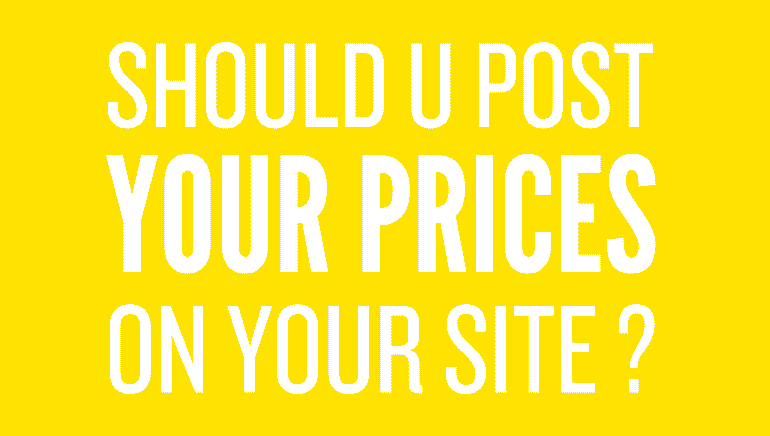Should you post your prices on your site?

According to Marcus Sheridan, the author of the book “They Ask You Answer,” the general recommendation is to include pricing information on your website. Sheridan argues that transparency in pricing helps build trust with your customers and sets realistic expectations. By providing pricing details upfront, you can filter out leads who may not be a good fit for your product or service based on their budget.

Sharing pricing information also helps you establish yourself as an authority in your industry. Many customers search for pricing details online, and if your competitors are providing transparent pricing while you’re not, you may risk losing potential customers who perceive your lack of transparency as a red flag.
However, it’s important to note that the decision to post prices on your website ultimately depends on your specific business model, industry, and competitive landscape. Some businesses, especially those offering complex or customizable solutions, may prefer to provide a general price range or request potential customers to contact them for personalized quotes. In such cases, providing an explanation of the factors that affect pricing can be helpful.
Consider evaluating your specific circumstances, customer preferences, and industry norms when deciding whether to post your prices on your website. Additionally, conducting market research and testing different approaches can provide insights into what works best for your particular business.

Consider evaluating your specific circumstances, customer preferences, and industry norms when deciding whether to post your prices on your website. Additionally, conducting market research and testing different approaches can provide insights into what works best for your particular business.
There are pros and cons to posting your prices on your website.
There are pros and cons to posting your prices on your website. Here are some of the reasons why you might want to post your prices:
- It can save time. If potential customers can see your prices upfront, they won’t have to contact you to ask for a quote. This can save you time and energy, and it can also help you qualify leads more quickly.
- It can build trust. When potential customers can see your prices, they have a better understanding of what you offer and how much it costs. This can help them build trust in your business and make them more likely to do business with you.
- It can help you attract more customers. If your prices are competitive, posting them on your website can help you attract more customers. This is especially true if you sell products or services that are in high demand.
However, there are also some potential drawbacks to posting your prices on your website. Here are a few things to consider:
- You may lose out on potential sales. If your prices are too high, you may scare away potential customers. On the other hand, if your prices are too low, you may be leaving money on the table.
- You may be compared to your competitors. If you post your prices on your website, you’re essentially inviting your competitors to compare their prices to yours. This can make it difficult to stand out from the crowd.
- You may have to update your prices frequently. If your prices fluctuate often, you’ll need to update your website accordingly. This can be a hassle, and it can also lead to confusion among potential customers.
Ultimately, the decision of whether or not to post your prices on your website is a personal one. There are pros and cons to consider, and the best decision for your business will depend on your specific circumstances.
Here are some additional tips for deciding whether or not to post your prices on your website:
- Consider your target audience. If you’re targeting businesses, they’re more likely to be comfortable with doing business with a company that posts its prices online. On the other hand, if you’re targeting consumers, they may be more likely to want to contact you to get a quote.
- Consider your pricing strategy. If you’re using a value-based pricing strategy, you may want to post your prices on your website. This will help potential customers understand the value of your products or services. On the other hand, if you’re using a cost-plus pricing strategy, you may not want to post your prices on your website. This is because your prices may be more sensitive to changes in the market.
- Test different approaches. You can always test different approaches to see what works best for your business. For example, you could post your prices on your website for a few months and see how it affects your sales. If you’re not happy with the results, you can always remove your prices from your website.
I hope this helps!
